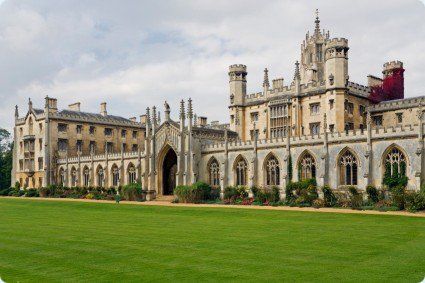Summer School on Literature in Cambridge University
Submitted by admin on Tue, 2014-05-06 16:52Are you interested in Literature?
If you are fond of Jane Austen's works, Shakespeare's, or Tolkien's, you should join Literature Summer School hosted by Cambridge University, United Kingdom. Have you ever read Dan Brown's Inferno? He wrote some pieces of stanza in Dante's Inferno. If you are eager to have a discussion on the poem, this programme also provides it in the schedule.
The programme will be held at International Summer Schools Mill Lane Lecture Theatres. It consists of two terms: the 2-week programme or the 4-week programme. It is open for overseas university studentsm, professionals or those interested in literature. The participants will be provided with discussions in small groups, close reading focusing on the text, and critical inquiry why literature plays an important role.
Taken from the official site of Literature Summer School [1], below is the information about the programme.
The academic programme
- Plenary course GH0:
Crime and Punishment [2] - Four special subject courses
(two for each week) - Evening lectures
Special subject courses
Classes allow for close and continuing discussion, and you will be expected to have done substantial preparatory reading before you arrive in Cambridge.
Term I: 6 – 19 July
Week 1 (6 – 12 July): Group Ga: 9.15am – 10.45am
Ga1 A long look at Rudyard Kipling [3]
Ga2 His 'scrupulous meanness': style, text and context in James Joyce's Dubliners [4]
Ga3 Jane Austen I: Pride and Prejudice and Mansfield Park [5]
Ga4 Cli-Fi? Climate change and contemporary fiction [6]
Week 1 (6 – 12 July): Group Ha: 2.00pm – 3.30pm
Ha1 Writing the death of the Raj [7]
Ha2 G K Chesterton: writer and thinker (and saint?) [8]
Ha3 Jonathan Swift, satirist in prose and verse [9]
Ha4 Russian sin: Anna Karenina, Crime and Punishment, Lolita [10]
Week 2 (13 – 19 July): Group Gb: 9.15am – 10.45am
Gb1 Three great British fantasists: Lewis Carroll, Mervyn Peake and J R R Tolkien [11]
Gb2 ‘A lifetime burning in every moment’: T S Eliot’s Four Quartets in context [12]
Gb3 Jane Austen II: Emma and Persuasion [13]
Gb4 The child in Edwardian fiction [14]
Week 2 (13 – 19 July): Group Hb: 2.00pm – 3.30pm
Hb1 From Baker Street to Bible John: British crime writing 1890-2000 [15]
Hb2 Form, style and ideology in Victorian poetry [16]
Hb3 Shakespeare: the mature comedies [17]
Hb4 The tragic South [18]
Term II: 20 July – 2 August
Week 3 (20 – 26 July): Group Gc: 9.15am – 10.45am
Gc1 Grime and crime: Dickens' Our Mutual Friend [19]
Gc2 From Troy to Ithaca and Rome: classical heroes, and those who care for them [20]
Gc3 Civilising sex in Spenser's The Faerie Queene [21]
Gc4 Major lyrics of the 17th century [22]
Week 3 (20 – 26 July): Group Hc: 2.00pm – 3.30pm
Hc1 Philosophy of literature: understanding other minds through fiction [23]
Hc2 The play's the thing: 20th-century American theatre [24]
Hc3 The Canterbury Tales [25]
Hc4 An introduction to Dante [26]
Week 4 (27 July – 2 August): Group Gd: 9.15am – 10.45am
Gd1 Mad or bad? Approaches to crime solving in Henry James' The Turn of the Screw and Conan Doyle's The Hound of the Baskervilles [27]
Gd2 War and trauma in Greek tragedy [28]
Gd3 More's Utopia: a radical Renaissance vision [29]
Gd4 The lyric voice in the 19th century [30]
Week 4 (27 July – 2 August): Group Hd: 2.00pm – 3.30pm
Hd1 Philosophy of literature: understanding other minds through fiction [31]
Hd2 Variations on the tragic [32]
Hd3 Shakespeare and the English sonnet [33]
Hd4 Dante's Inferno [34]
Plenary lectures
Following the theme Crime and Punishment [2], speakers deal with the idea of a criminal subculture, questions of justice and forgiveness, and the rich literature of guilt, vengeance, confession, and complaint. You will hear a rich variety of voices, and critical approaches. Plenary lectures bring fresh perspectives to familiar masterpieces and encourage exploration in new directions.
Evening lectures
Additional general evening lectures [2] will add to your enjoyment of the programme.
Accommodation
Accommodation is available for participants who want to stay in a Cambridge College. Please see the accommodation options [35]available for this programme.
Non-residential attendance is also available if participants prefer to find their own lodgings.
Programme fees
Programme fees include tuition, bed, breakfast and evening meals unless otherwise indicated.
Click here [36] to see the options available.
Pre-enrolment information
Booking terms and conditions [37]
Downloads
2014 brochure [38] as a PDF (5.31MB)
Application form [39] as a PDF (113KB)
Contact us
University of Cambridge
International Programmes
Institute of Continuing Education
Madingley Hall
Madingley
Cambridgeshire
United Kingdom
CB23 8AQ
Tel: +44 (0) 1223 760850
Fax: +44 (0) 1223 760848
Email: intenq@ice.cam.ac.uk [40]
Comments
Teaching and assessment is in English. Students for whom English is not their first language should refer to the Competence in the English Language Policy [41] for further guidance.
Printable versions of our brochures are available to download from the Summer Schools brochure download page [42].
Further info, click Literature Summer School [1].

